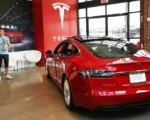Rivian, once hailed as a pioneer in revolutionizing the truck and SUV market with its electric vehicles (EVs), has encountered a significant setback. In a move that suggests a need for course correction, the company announced a 10% reduction in its workforce. The rationale behind this decision? It appears that the EV market is proving to be more competitive and challenging than initially anticipated, with pricing pressures intensifying.
The reality of manufacturing cars, let alone making them profitable, has hit Rivian hard. This recent round of layoffs follows previous reductions, with 6% of staff cut a year ago and another 6% let go around 18 months ago.
Despite these challenges, Rivian is preparing to launch its R2 series vehicles early next month, which is expected to provide some relief to the company’s profit margins.
As Rivian navigates through these turbulent times, questions linger about whether this is merely a temporary setback or a portent of more significant challenges ahead. The EV market’s drama unfolds, offering a compelling narrative akin to a gripping soap opera.
Most interesting startup stories this week

In a bid to overcome the challenges posed by its underwhelming 2023 sales figures, Lucid Motors has embarked on a bold strategy to revitalize interest in its electric sedans. The company has opted to slash prices across its lineup, aiming to capture attention in a highly competitive EV market.
The decision to reduce prices signifies a plea for recognition in an industry where established players dominate. Despite its founding in 2007, Lucid Motors finds itself struggling to assert its presence, akin to a newcomer attempting to compete in a high-speed race with inadequate equipment. The Lucid Air Pure, previously priced around $80,000, now boasts a more enticing price tag of $69,900, making it more accessible to potential buyers.
This move follows a sobering revelation that Lucid Motors managed to deliver only 6,001 cars throughout the entirety of 2023. This figure pales in comparison to the company’s ambitious projection of shipping 90,000 cars in 2024, hinting at a significant disparity between expectations and reality.


















